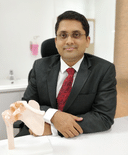Shoulder replacement - Know all about it!!!!
A shoulder replacement surgery is performed when your shoulder is so seriously injured that it has to be changed for normal functioning to continue. It may also happen when the bones of the joints are so badly broken that they cannot be fixed in a way that your shoulder can function properly. Apart from bone fractures or sudden injuries, some diseases like crippling arthritis can require you to undergo this surgery. It should only be done if the condition cannot be fixed with the help of physiotherapy, exercise or medication first.
It is advised that patients undergo this surgery with shoulder surgeons trained for this surgery.
Types of shoulder replacement surgery
There are several types of shoulder replacement surgery. They are-
• Total replacement surgery - This surgery is more commonly done than the other types. The joint at the shoulder is a ball and socket joint, meaning a ball-like bone fits into a socket like joint. In this surgery the ball is replaced with a metal ball and the bony socket with metal socket with a plastic component in between.
• Partial replacement surgery - In this type of surgery, only the bony ball is operated upon and replaced with a metal ball.
• Reverse replacement surgery - In this procedure, a bony ball is replaced with metal cup and the bony cup is replaced with metal ball i.e the alignment of the joint is reversed. This surgery is done in elderly patients with arthritis due to neglected rotator cuff tears or in shoulder fractures which badly broken bones. These patients usually have very little movement in the shoulder
Things you can do before surgery to facilitate the process
• You should get diagnostic tests done well in advance, like X-rays and related imaging.
• You should cut down on the level of your addictions, like smoking and drinking.
• The doctor will ask you to reduce intake of certain medicines like painkillers.
Recovery after shoulder replacement
- The stay in hospital is usually 2-3 days. Advanced pain management techniques are used nowadays for virtually painless experience after surgery.
- Usually shoulder movements are started after pain relief.
- Patients are able to do daily activities in 3 weeks but lifting hand overhead may take some weeks thereafter.
- You should ask a friend or relative to help you with daily tasks around the house, and for transport for the first few weeks.
- Supervised rehabilitation under an experienced physiotherapist is a must.
- Many patients gain near normal function and are able to do daily activities of living.
- You will need to change your daily routine a bit, like avoid putting heavy strain on the shoulders or lifting weights.



+1.svg)
